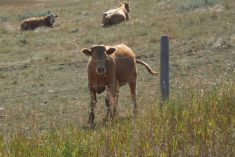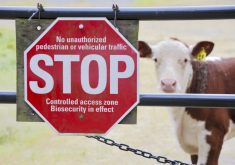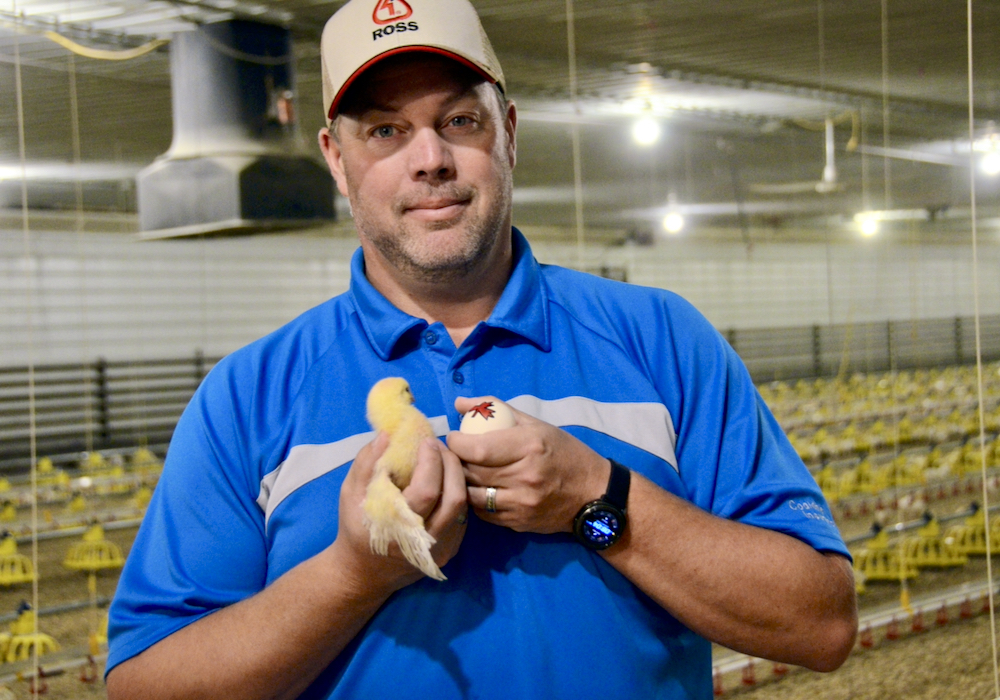Experts say the PEDv outbreak in Manitoba is a warning to livestock producers across the Prairies that biosecurity has to be a 24-7 priority every day of the year.
Since late April, the porcine epidemic diarrhea virus has been found on 10 farms in three areas in southeastern Manitoba — and two of those areas suffered outbreaks just last year.

“We’ve heard of a lot of scary practices happening on our negative farms that are in diseased areas,” said Mark Fynn, manager of quality assurance and animal care programs for Manitoba Pork.
So far, officials have found “some linkages” between the three areas where the disease has emerged, but are still working on tracing the spread of the disease, including looking at staff movement, transport, and contamination on load-out areas on each of the operations.
“We’re definitely looking at a multifactorial, multi-faceted component of spread,” said Glen Duizer, Manitoba’s acting chief veterinary officer.
“It does appear to be happening in geographic areas, and there are two components of it — something is bringing it onto the yard, and there is a potential gap of some kind or another where it makes its way into the barn.”
Read Also

Farming Smarter receives financial boost from Alberta government for potato research
Farming Smarter near Lethbridge got a boost to its research equipment, thanks to the Alberta government’s increase in funding for research associations.
But the issue isn’t that the affected farms didn’t have good biosecurity protocols — rather, it was putting them into practice every day.
“When we talk about protocols and what we’re supposed to be doing, we forget about that objective,” said Fynn. “Focusing on that objective helps people realize what they’re trying to accomplish and how that might be accomplished — not just what’s written on a standard operating procedure.”
PEDv, which is characterized by severe diarrhea and vomiting and is typically fatal for piglets, is spread by feces.
Once the animals on the affected premises move to non-shedding status (the point where they are no longer shedding the disease in their feces), the immediate danger to other farms will have passed, but “we’re at least a couple of months away from that,” he added.
“We remain committed to working with the affected producers in addressing the current outbreak and getting it under control as quickly as possible.”
Biosecurity measures
Live pig movements are “the biggest risk factor” associated with PEDv, said Fynn.
“Knowing the status and minimizing the number of sources you have coming into your herd is pretty critical,” he said.
That also means ensuring that the trailer they’ve been shipped on is “especially clean.”
“Make sure it’s washed with detergent to the point where you don’t see anything left in that trailer,” advised Fynn. “Anything that’s left on that trailer that those incoming pigs are getting on could potentially get picked up by the pigs and brought into your barn.”
It’s important for outgoing trailers to be clean, too.
“We have to focus on what we’re doing as far as load-out biosecurity goes,” said Fynn. “After we’re done shipping a load of pigs out, we want to follow the same objectives and steps in how we go about cleaning that load-out as what we expect from those trailers coming into the yard.”
Transport between farms and plants is also a problem, he added. In some cases, truckers are not following cleaning and disinfection best practices between loads from two or more farms to the plant.
“We want to do cleaning and disinfection between every load and definitely between every farm within the diseased area,” said Fynn. “Best practice from a disease management point of view would be to throw a cleaning and disinfection step in between every load we send to the plant.”
It may be inconvenient, but “nobody ever said that biosecurity is convenient.”
“I’ve heard it said that it’s not biosecurity unless it’s inconvenient,” said Fynn. “But these things are important because what’s more inconvenient is having a bunch of your pigs break (out) with PED.”















